Life in the Metaverse – Surviving the Memepocalypse
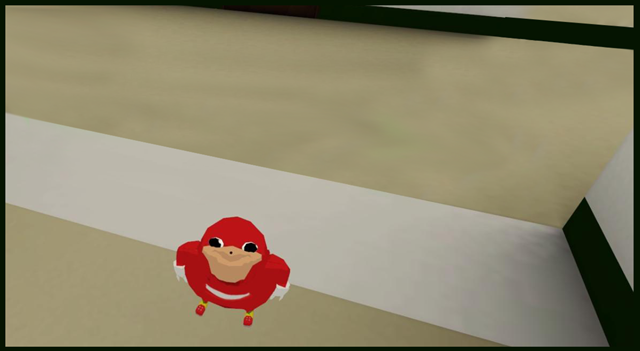
This is not your friend. Repeat, THIS IS NOT YOUR FRIEND.
So, that’s like…
The omega. The apocalypse. Where the world of Mad Max begins and we deploy huge fleets of spiky vehicles to burn ridiculously rare gasoline to hunt for ridiculously rare gasoline because it gives us an excuse for kickass car chases. The end of the world as we know it. The destruction of all we hold dear…
By memes.
Okay, I’ll Humor You. How Does THAT Happen?
Imagine, if you will, an unspoiled island of artistic creativity and social harmony that has existed, quietly, for over four years, in the shadow of the wild Internet sea. One of the oldest, if not the oldest, social VR environments, with a small team of devoted, passionate developers and equally passionate users working together to create the dream we all share: the Grid. The OASIS. The metaverse.
Or, as we call it, VRChat.
While other social VR platforms struggle to survive in the Wild West land grab for virtual real estate, VRChat, despite its many innovations and creative community, somehow manages to go unnoticed by the mainstream VR news sites. As lesser platforms rise and fall, thrown into chaos by roving packs of thirteen-year-olds shouting racial slurs, VRChat, with its small community, flourishes and grows.
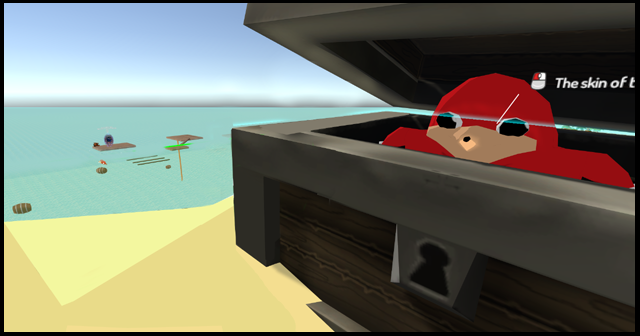
Do not be tempted. Do not open this chest, OR YE SHALL BECOME LIKE THEM.
The first big expansion is VRChat’s Steam launch, which expands its userbase, but in measured steps. New users wearing freshly purchased VR headsets find and are mentored by experienced users, working together to build a metaverse of wild ideas that is also for some reason filled with male anime girls. And again, VRChat remains largely unnoticed by the mainstream VR news sites and video game blogs. This keeps it free (for a time) from the hordes of toxic, disruptive users who flood other social VR apps.
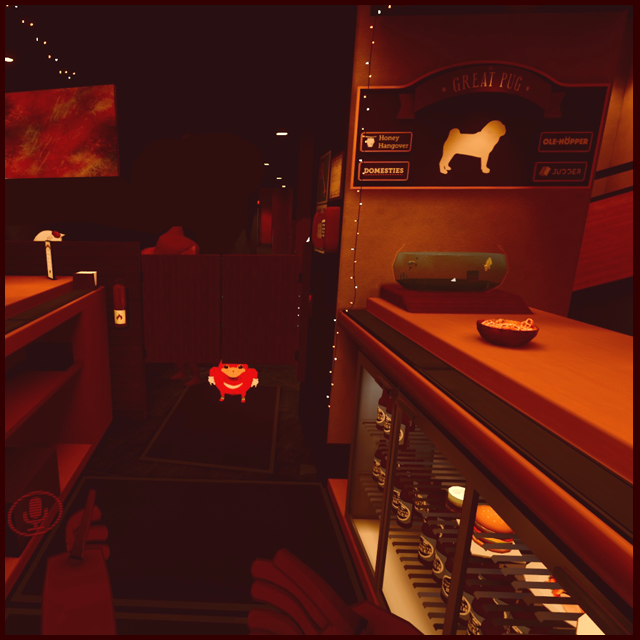
There’s never just one. The moment you spot one, be assured you have an infestation and alert the appropriate authorities. Also, KILL IT WITH FIRE.
Most of VRChat’s regular users are adults with steady jobs (VR headsets, of course, are not remotely cheap) and the majority are all passionate about virtual reality, social VR, and creating shared worlds and experiences. Together, they create hundreds of worlds and thousands of avatars, building events such as live talk shows and podcasts and karaoke nights and improv theater. For a time, it is good, and many of these users speak hopefully of the future and the bright road ahead for social VR.
Until the dark times.
Until the Knuckles.
Right, You’re Going to Need to Explain That One
At some point, a user sends a popular streamer a clip of a particularly expressive anime girl puckering up for a kiss in VRChat. Other streamers, made curious, themselves discover VRChat and are amused and amazed by the random awesomeness the community has wrought. Their viewers are equally fascinated and download the app, and the population of VRChat grows. 100 users turn into 200 the next week, and 400 the week after, and 1000, and 5000, and 15000. And as thousands of new users arrive, it happens.
The peaceful island of artistic creativity has been uncovered, and the Knuckles horde decides to troll it.
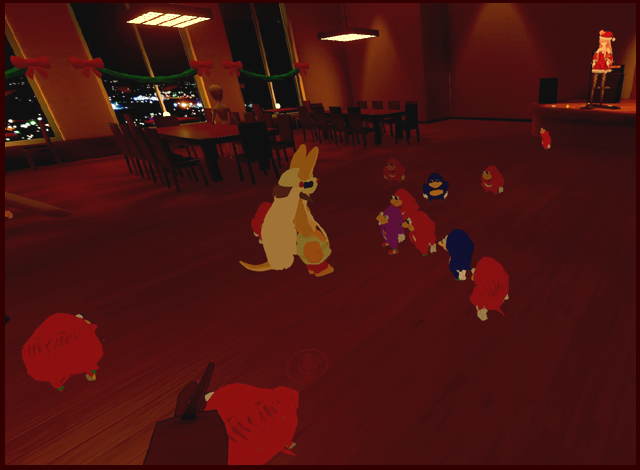
This unfortunate VRChat user is about to be mildly annoyed for a few minutes.
Resurrecting a two-year-old meme, hundreds of dedicated Internet rapscallions cloak themselves in Knuckles avatars and flood the servers of VRChat. Coordinating in dozens of teams of 5-to 15, they spend days surrounding new users and asking “Do u know da way?”, entirely too amused by the fact that this sometimes annoys people. Meanwhile, streamers (seeing the comic potential) capture it all, like amateur journalists documenting a zombie apocalypse (except, you know, with deformed Knuckles).
In a matter of days, almost all the major VR news sites and popular gaming news sites that have ignored VRChat for its four years of inspiring artistic growth suddenly “discover” it and, upon witnessing the fresh hell that is dozens of Knuckles Islands, derisively label the app “The Land of Knuckles and Memes.”
No mention is given to the huge amount of super cool art and events the community created in the years before the meme bomb dropped. Instead, all that is ignored as VR and game journalists write stories making jokes and poking fun at what they see only as a world of meme-inspired insanity. Curious viewers who see the Knuckles hordes in Youtube videos wrinkle their nose and say “Ew, VRChat … you mean the app with all the twelve-year-olds wearing Knuckles avatars? Why would I want go *there?*”
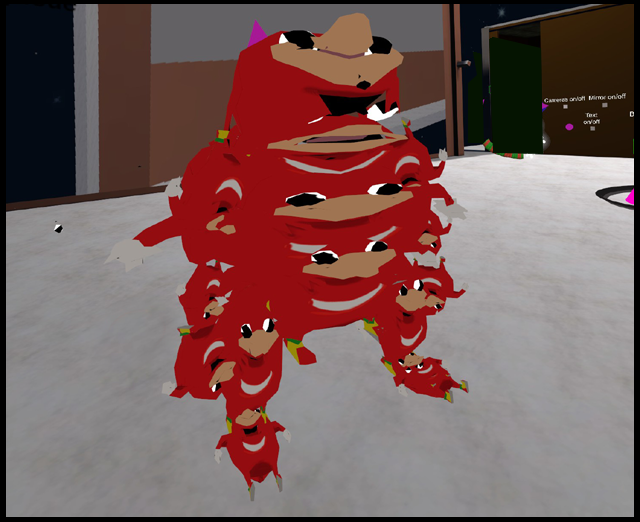
Even at its most stupid, VRChat is still a platform with incredible creativity. THIS IS A KNUCKLES VOLTRON.
Thus, the world as it once was is destroyed as Knuckles wash over the land and existing users retreat to Friends Only bunkers, shaking their heads in bemusement as they wait for the Internet horde to grow bored. The Memepocalypse has come, inspired by a silly joke from a two-year-old Youtube video, and VRChat is forever changed because of a bunch of bored teenagers who thought it’d be kind of funny.
Wow, That’s Actually Kind of Sad
Isn’t it, though? As always, the development of the fledgling metaverse proves far weirder and unexpected than any of our great SF writers have ever imagined. Cyberpunk writers had written of corporate takeovers, the spread of intelligent AI, of viruses that paralyze users or lockdowns that trap everyone in VR as they play MMORPGs in real life. Yet not one writer imagined the actual scourge that would sweep across the early metaverse – meme-obsessed teenagers attempting bad comedy.
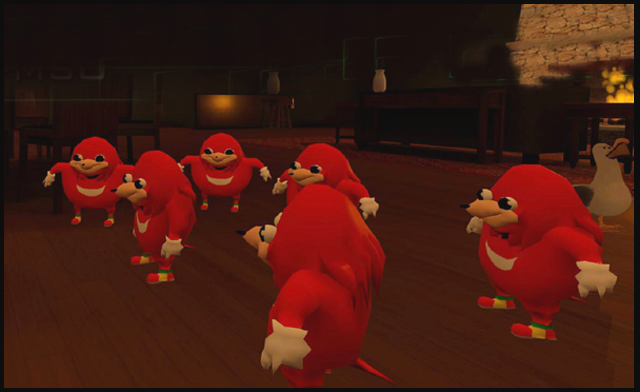
“I have bad news, my friends. We have wasted our lives.”
So That’s It? The Metaverse Is Over?
Actually no. The whole Knuckles thing is already getting old and is in the process of dying out. The small team of talented developers and their loyal community of users have weathered the meme bombs, continuing to make awesome stuff and host awesome events (though now heavily moderated). The community only grows stronger, like a body rejecting a virus, and the advance of social VR plows on.
While the simple, idyllic world the existing users of VRChat once knew will never again exist, the security measures provided by VRChat’s developers have saved a sizable pocket of civilization from the Knuckles hordes. New users arrive, bewildered by the chaos, and veteran users undertake rescue missions, heading into the pandemonium of public worlds to find people actually interested in VR and whisk them off to the safety of a Friends List and a large, resilient community generous both with its time and experience.
While some users will be discouraged forever by the Knuckles horde, others will stick around as the increased popularity of VRChat continues to attract new social VR users long after the islands of deformed and spitting echidnas are but a memory. VR and game journalists will eventually actually research VRChat, explore it, and discovery how amazing it is, instead of spending five minutes being trolled and then writing lazy joke articles for clicks. VR headsets will grow cheaper and more common, and desktop users who once gleefully annoyed VR users to amuse themselves will finally enter the world they sought to disrupt and, perhaps, in an epiphany, understand its appeal.
No matter the memes ahead, VRChat’s community will remain strong, united, and creative as ever. Virtual life goes on and the metaverse continues to develop, unpredictable and bizarre. And all the while the next meme hovers beyond the horizon, ready to be just as stupid as the last one…
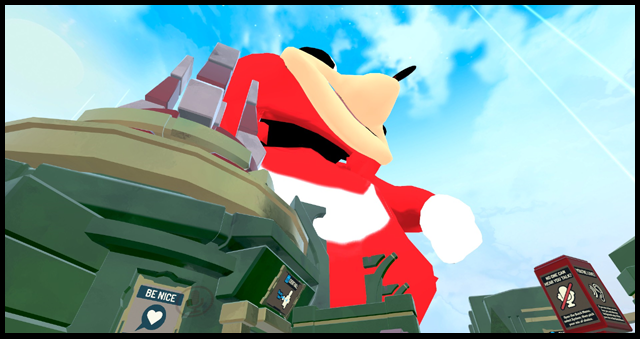
“I couldn’t help it. It just … popped in there.” “What? WHAT just popped in there?”

[…] so long as the bars aren’t flooded with deformed knuckles, there’s nothing to be worried […]